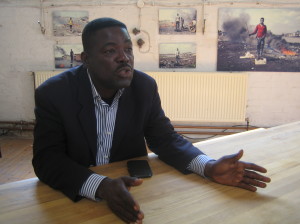There have been many reports about the illegal exportation of electronic waste from Europe to Ghana in the past. Although all European countries signed the Basel Convention, which bans the export of hazardous waste (which e-waste always is) to non-OECD-countries, new, functional, and repairable devices are legally being shipped to India, China, Nigeria, or Ghana. However, it seems infeasible for customs authorities to effectively police prohibited waste shipments versus permitted exports. As a consequence, e-waste from Germany and other Western countries ends up in the illegal dump site of In Germany, two documentaries on this, „Giftige Geschäfte – Der Elektromüll-Skandal“ and „Die GPS-Jagd – Wo landet mein Schrottfernseher“ recently raised a lot of attention about this. We met Mike Anane, environmental activist and journalist in Accra, at a photo exhibition by Kevin McElvaney and talked with him about the social impacts, manufacturer responsibility, and why we see him in every single documentary on this subject.
Archiv des Autors: Sebastian Beschke
Stehen faire Computer zur Wahl?
Am 25. Mai stehen die Wahlen zum europäischen Parlament an. Wichtige Themen, die auf europäischer Ebene zu klären sind, gibt es genug – seien da das transatlantische Handelsabkommen TTIP, der Umgang mit Asylsuchenden, oder die Bewältigung der Folgen der Eurokrise. Was die Wahl für die Schaffung menschenwürdiger Bedingungen im Lebenszyklus von Elektronikprodukten bedeutet, soll in diesem Beitrag beleuchtet werden. Weiterlesen
Fairphone: An unfulfilled promise
This is an English translation of the article Fairphone: Zu viel versprochen. Eine Bilanz by Sebastian Jekutsch. (Please note that this article is outdated.)
For over three years, I have been concerning myself with fair electronics and especially IT. I first noticed the Fairphone project near the end of 2010: A feel-good video directly from the Southern D.R. Congo’s mining areas, where the team bought a few bits of (purported) cobalt ore directly from the workers, and advertised this as the first step towards a fair mobile phone. It seemed pretty naïve. I noticed that there was not a single technician on the team, so that the whole thing seemed to be more of a marketing experiment than a serious hardware development project. And besides, how should one go about producing a fair phone if even a computer mouse can only be made partially fair?
But it was built! The phones have actually been manufactured, and we can take stock: How fair is the Fairphone?
I will be concentrating on three aspects that are especially important and concern the fairness of the product: the sourcing of raw materials, the working conditions in manufacturing, and transparency in general. I test these according to Fairphone’s two promises: that the Fairphone is “ethically sourced,” and that it “inspires the industry.”

